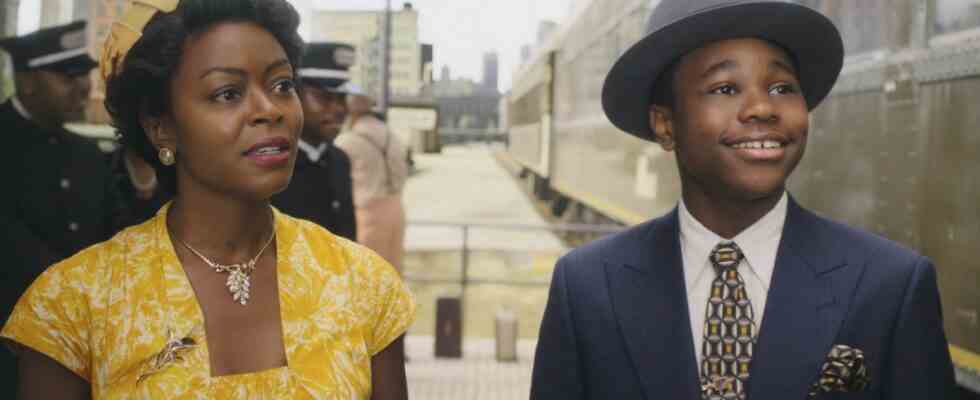He is charming and elegant, blue suit, hat and speckled tie, a little dandy in the big city of Chicago. Emmett Till, an African American, fourteen years old, his mother dressed him up for the trip to his uncle in the provinces, in the small town of Money, Mississippi. It’s the summer of 1955.
It will be a journey with a terrible ending, with a brutal lynching that director Chinonye Chukwu tells about in her new film. Emmett is dragged out of bed one night by two white men. They claim he molested a white woman. The uncle and his family beg for mercy, the whites are implacable. Emmett is tortured and then shot, the body is supposed to disappear into the river but reappears days later. The mother, Mamie Till-Mobley, demands that she be taken to Chicago.
There she has the dead, maltreated boy laid out in an open coffin, the corpse has been brutally mangled – the world should see what was done to him. Mamie also goes to Money, testifies at the trial against the two perpetrators – although everyone knows how such trials end in southern America, with twelve white men on the jury and a defense attorney who uses lousy tricks to defame the Till family. But the murder and the trial and the photo of the corpse will give the civil rights movement in the United States a powerful boost.
The woman claims the boy sexually assaulted her. That’s bad for a black teenager in Mississippi
Emmett is a smart sunny boy with a cheerful disposition as he prances through his teenage life at his mother’s side, singing happily in the car. The mother takes care of her young with care and vigour. Before leaving, she hands him the tie that she has tied for him. Emmett insists on wearing his father’s ring, which fell in the war. When she says goodbye to him on the platform, he looks like a small version of his father.
They have different rules for us in Mississippi, Mamie admonishes her son, if you’re there, hunker down. In addition to the provincial open racism, there is also the social divide. Emmett, who is taken to the harvest by his uncle and his boys, fools around in the cotton field and is given time off work. He then goes to a drugstore in town with the boys, buys a few candies, lets out a few charming phrases to the woman behind the counter. Another whistle when leaving, an awkward attempt at youthfully charming flirtation, completely out of place. The woman stares at him, dumbfounded, then starts running. The boys start running too, only Emmett doesn’t get it: “She’s going to get her shotgun!” Her husband is one of those guys who are going to kill Emmett. The woman will testify in court that Emmett sexually assaulted her.
Everyday life of racism. It is an occasion, a reaction, a brutality that was not even discussed in public at the time. The film praises the painful determination with which Mamie brings her personal suffering into the political struggle of African Americans. And the courage that the uncle summons up when he is willing to testify against white men in court in his hometown. The black people who came to Mamie’s post-Money trial—lawyers, civil rights activists, journalists—appear as aliens.
The Tills are part of Chicago’s affluent society, socially advanced, but politically at the mercy of the inner turmoil of American society. Mamie’s hair is perfectly styled, she wears fancy suits and hats, earrings and white gloves, she has a good job as a secretary, the only African American woman in the office. But their desperation, their pain, their memories provide the glamor of their late performances.
untill, USA 2022 – Director: Chinonye Chukwu. Book: Michael Reilly, Keith Beauchamp, Chinonye Chukwu. Camera: Bobby Bukowski. Editing: Ron Patane. Music: Abel Korzeniowski. Starring: Danielle Deadwyler, Jalyn Hall, Whoopi Goldberg, Sean Patrick Thomas, Frankie Faison, Haley Bennett, John Douglas Thompson. Universal, 130 minutes. Theatrical release: January 26, 2023.

